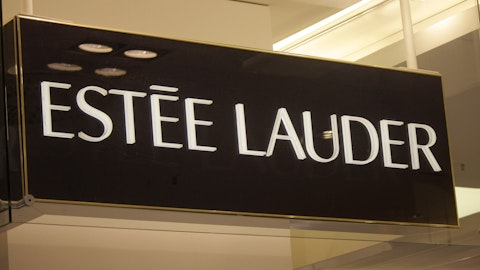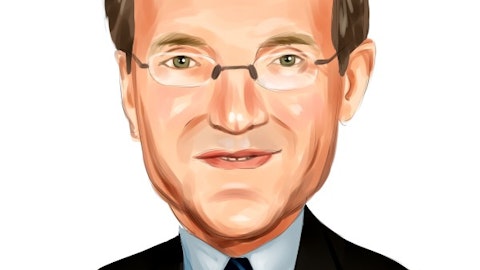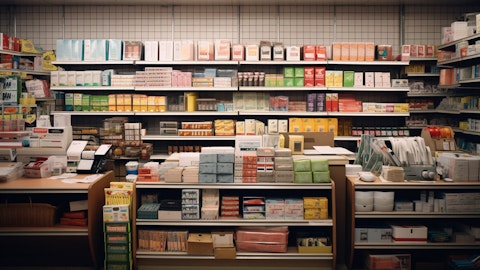The Estée Lauder Companies Inc. (NYSE:EL) Q1 2024 Earnings Call Transcript November 1, 2023
The Estée Lauder Companies Inc. beats earnings expectations. Reported EPS is $0.11, expectations were $-0.22.
Operator: Good day, everyone, and welcome to The Estée Lauder Company’s Fiscal 2024 First Quarter Conference Call. Today’s call is being recorded and webcast. For opening remarks and introductions, I’d like to turn the floor over to Senior Vice President of Investor Relations, Ms. Rainey Mancini. Ma’am, you may begin.
Laraine Mancini: Hello. On today’s call are Fabrizio Freda, President and Chief Executive Officer; and Tracey Travis, Executive Vice President and Chief Financial Officer. Since many of our remarks today contain forward-looking statements, let me refer you to our press release and our reports filed with the SEC, where you’ll find factors that could cause actual results to differ materially from these forward-looking statements. To facilitate the discussion of our underlying business, the commentary on our financial results and expectations is before restructuring and other charges and adjustments disclosed in our press release. Unless otherwise stated, all organic net sales growth also excludes the noncomparable impacts of acquisitions, divestitures, brand closures and the impact of foreign currency translation.
You can find reconciliations between GAAP and non-GAAP measures in our press release and on the Investors section of our website. As a reminder, references to online sales include sales that we make directly to our consumers through our brand.com sites and through third-party platforms. It also includes estimated sales of our products through our retailers’ websites. [Operator Instructions]. And now I’ll turn the call over to Fabrizio.
Fabrizio Freda: Thank you, Rainey, and hello to everyone. We appreciate you joining us to discuss our first quarter results, revised outlook for fiscal year 2024 and accelerated profit recovery plan to benefit fiscal year 2025 and 2026. Before we begin, I want to start by expressing the tremendous grief and sadness we have for the victims and their families of the horrific terrorist attacks against Israel, the tragic loss of Palestinian lives and the growing humanitarian crisis in Gaza. Our hearts break for the profound suffering across the Middle East during this terrible time. We are committed to continuing to support the safety and well-being of all our employees in the affected areas and around the world. Let me now turn to our first quarter results.
We delivered our outlook for organic sales and exceeded the expectation for adjusted diluted EPS. Organic sales decreased 11%. Our global travel retail business drove the decline, as expected, with organic sales lower by 51% given the combination of trade inventory reduction and a structured market containment. The entire rest of our global business rose 4% organically, led by mid- to high single-digit growth in the Americas and the markets of EMEA and double-digit growth in Asia Pacific, excluding Mainland China. The excellent performance in these regions enabled us to deliver our sales outlook despite a slower-than-expected recovery of overall prestige beauty in Mainland China. Adjusted diluted EPS of $0.11 was ahead of the outlook as we achieved a better-than-expected adjusted operating margin.
There were several drivers for this more favorable profitability, led by a greater contribution to sales from skin care than forecasted as well as disciplined expense management. Notably, we continued brand-building investments in the areas with the greatest growth opportunities with AP spending rising as a percentage of sales. While we had a better-than-expected start of the fiscal year, we are lowering our fiscal year 2024 outlook given the further incremental external headwinds in 2 specific areas of our business. First, the expected growth rate of overall prestige beauty has slowed in Asia travel retail and Mainland China, which is currently also evidenced in the presale phase of the 11.11 Shopping Festival. To reflect this impact as well as the ongoing policies and efforts to contain a structured market activity, we are moderating our expectation for fiscal year 2024 retail sales for Asia travel retail and Mainland China.
As part of this, we continue to expect to reset retail inventory in Asia travel retail by the end of the third quarter. Second, we are reflecting the risks of business disruption in Israel and other parts of the Middle East. For fiscal year 2024, our revised outlook continues to expect sequentially improving sales trend each quarter with double-digit organic sales growth in the second half. We also still expect sequentially stronger adjusted operating margin each quarter with continued consumer-facing investment in our growth engines. Moreover, we are accelerating and expanding our profit recovery plan, which is designed to benefit fiscal year 2025 and 2026 for us to realize our ambitions to rebuild profitability despite the external headwinds’ increased pressure on the business in fiscal year 2024.
On our earning call in August, I described our 4 strategic imperatives for fiscal year 2024, which are, drive momentum where our business is thriving, return to growth in the U.S., capture demand from the returning individual travelers in Asia travel retail, and begin to rebuild our profitability. Let me share with you our progress across these pillars as well as the framework of our accelerated and expanded profit recovery plan. First, we are focused on extending the gains we achieved in fiscal year 2023 in the numerous developed and emerging markets around the world where we prospered. In the first quarter, we did just that. In the markets of EMEA, we achieved impressive results once more driven by the U.K. and Germany. Organic sales growth were balanced across brick-and-mortar and online as engaging activation in store and on social media resonated strongly with consumers across our brand portfolio.
We extended our prestige beauty share gains in Western Europe driven by our high-quality hero products and innovation. In EMEA’s emerging market, India was a standout driven by stellar gains by The Ordinary and double-digit growth by M·A·C. In Latin America, prestige beauty remains vibrant, and we again achieved strong results. Mexico and Brazil excelled, each up double digits organically. Our localized go-to-market initiatives in these 2 dynamic emerging markets have succeeded in attracting new consumers. We continued our winning ways in many markets across Asia Pacific. The evolution of Hong Kong’s SAR is especially compelling. And we realized very strong prestige beauty share gains with our brands’ strong desirability, high-touch services and innovation engaging consumer as retail traffic increasingly returns.
Our performance in Japan and Australia once again robust driven by our diversified brand portfolio catering to local desires. Around the world, our direct-to-consumer business performed especially well. Every region contributed, led by double-digit organic sales growth in freestanding stores in Asia Pacific. On a global basis, we are thrilled that the makeup renaissance is infusing, and we have been ready to meet consumers as they again embrace their enthusiasm for the category. Makeup thrived in the quarter as the Americas, the markets in EMEA and Asia Pacific each contributed high single-digit organic sales growth to offset the pressure in the category from global travel retail. We are successfully tapping into and creating trends with on-point innovation like M·A·C Studio Radiance Foundation and Estée Lauder Futurist SkinTint Serum Foundation.
During this exciting area for the category, our brands are leveraging their expert artists and social media know-how to engage with consumers and generate strong and expanding levels of earned media value. Fragrance again prospered. We delivered our 11th consecutive quarter of organic sales growth led by outstanding performance in the Americas and Asia Pacific, strong share gains in prestige fragrance in Western Europe. We continue to believe that we are still in the beginning of a promising long-term phase of growth for fragrance in Asia Pacific as consumer increasingly embrace the category and penetration levels are low relatively to the West. Indeed, in Asia Pacific, fragrance represent 8% of the prestige beauty industry, whereas in Western Europe, it is 40% of the industry.
We are well positioned for this growth opportunity with our luxury and artisanal brands’ alignment with the trends in the region as consumer gravitate to fragrance collections in addition to single use trends for multiple distinct scents of the highest quality. Moving to our second pillar. We are focused on returning to growth in the U.S. for the full year and made strides in the first quarter when encouragingly, our organic sales growth improved strongly on a sequential basis and moved from a modest decline last quarter to mid-single-digit growth this quarter. Our multifaceted strategic plan included launching a robust innovation pipeline with increased focus on breakthrough ideas and leading trends, increasing engagement by brands on social media to realize greater earned media value, accentuating our strength in luxury and artisanal fragrance and in high-performance, ingredient-led and derma skin care and expanding brand reach in specialty-multi to attract new consumers.
During the first quarter, innovation proved to be a powerful catalyst for growth in the U.S. across every category. The contribution are many from Clinique, High Impact High-Fi Full Volume Mascara and M·A·C Studio Radiance Serum Powered Foundation in makeup to Estée Lauder Advanced Night Repair Rescue Solution in skin care and more. Through these high-profile launches with sophisticated media strategies, our brands elevated their engagement on TikTok, Instagram and other platforms. Impressively, M·A·C’s earned media value in the U.S. Beauty improved several ranks to #2 in the month of September, further solidifying its #1 rank globally. We also achieved strong progress in fragrance in the U.S. driven by our luxury and artisanal brands.
Le Labo, Tom Ford and Jo Malone London each rose double digit driven by multiple growth engines from innovation to online, brick-and-mortar and expanded consumer reach. Encouragingly, we returned to growth in skin care in the U.S. The Ordinary was a standout. Consumers continue to gravitate to the brands for its scientific, ingredient-led skin care, driving strong prestige beauty share gains. The brand launch of Soothing & Barrier Support Serum drove exceptional new consumers acquisition trends on brand.com and strategically expanded The Ordinary portfolio to include more multi-active products. Moreover, Estée Lauder and La Mer further bolstered our improving performance in the category. Let me now discuss the third pillar, to capture demand from the return individual travel in Asia travel retail.
For the first quarter, retail sales in global travel retail were substantially ahead of our organic sales decline, which reflects the execution of our priority to reduce trade inventory in alignment with retailers. Indeed, we are making solid progress through exciting activation of our heroes, capitalizing on innovation and investing in beauty advisers. Across these 3 pillars, one of our greatest strengths to leverage is our diverse brand portfolio, which was a fundamental driver of our progress during the first quarter. M·A·C’s excellent performance showcased the strength of our portfolio among large brands, while The Ordinary drove double-digit organic sales growth among our scaling brands and Le Labo excelled, rising over 40% among the developing brands.
Let me now turn to our fourth pillar, rebuilding our profitability. We are accelerating and expanding upon our profit recovery plan. We expect to realize $800 million to $1 billion of incremental operating profit across fiscal years 2025 and 2026. The plan consists of 4 building blocks to improve each of gross margin and operating margin. First, we are focused on optimizing mix by elevating luxury across brands, most especially in skin care and fragrance, driven by consumer preferences by expanding our direct-to-consumer ecosystem across brick-and-mortar and online. Second, we have identified many opportunities to maximize value through better price realization and accretive innovation. Third, we intend to increasingly leverage the strategic investment we have made over the last few years, most notably our new manufacturing facility in Japan, our new China innovation labs in Shanghai and expanded online capabilities.

Lastly, we believe we can unlock meaningful cost efficiency from a combination of shorter supply chains, regionalization of our value chain and improved forecasting accuracy enabled by our new integrated business planning progress — process across the global operation supported by advanced AI capabilities. Before I close, I’m pleased to share that today, we will release our fiscal year 2023 social impact and sustainability report. The future advancement made possible by the extraordinary efforts of our employees around the world across our ESG areas of focus and previously stated goals. Importantly, we again achieved Scope 1 and Scope 2 carbon neutrality and maintained our status of 100% renewal electricity globally for our direct operations.
The report also details that we obtained our global gender pay equity target for selected employees populations and achieved our spending targets with women- and black-owned suppliers and made strong progress toward our water withdrawal reduction and packaging targets. Today, we will also publish our second climate transition plan, which describes the effort in our ongoing climate transition journey. In closing, in fiscal year 2024, we will remain focused on driving momentum in our markets of strength, returning to growth in the U.S., normalizing our Asia travel retail trade inventory, and expanding prestige beauty share further in Mainland China from our calendar 2-year date gains while accelerating our profit recovery plan for a robust acceleration of profitability in fiscal years 2025 and 2026.
To our employees, these are difficult times for the world and all of us. I’m grateful for what you do each and every day in caring for each other and for our beautiful company. Thank you. And I will now turn the call over to Tracey.
Tracey Travis: Thank you, Fabrizio, and hello, everyone. Let me begin with a brief review of our first quarter results in order to devote the majority of my discussion to our revised fiscal 2024 outlook and our profit recovery plan. Our first quarter organic net sales declined 11%, and earnings per share was $0.11. From a geographic standpoint, organic net sales in the Americas increased 6%, led by mid-single-digit growth in North America and continued strength in specialty multi. In Latin America, net sales rose high single digits and was driven by continued strength in makeup as well as strong growth in both brick-and-mortar and online channels. Organic net sales in our Asia Pacific region fell 3%, primarily due to incremental headwinds from the slower-than-expected recovery of overall prestige beauty in Mainland China.
There were several bright spots in the rest of the region, led by triple-digit growth in Hong Kong SAR as well as double-digit growth in Japan and Australia. Our strategic investments in brand activation and new product innovation continue to resonate well with consumers in these markets. Hong Kong SAR also benefited from increased traffic in brick-and-mortar due to fewer COVID-related restrictions compared to last year and the resumption of tourism. Organic net sales fell 27% in Europe, the Middle East and Africa due to the ongoing headwinds in our Asia travel retail business. The overall challenges in our travel retail business more than offset the performance in the rest of the region, where we saw strong growth in skin care and makeup as well as growth in most Western and emerging markets.
Organic net sales growth was driven by our developed markets, led by the U.K., Germany and France. From a category perspective, fragrance continued to lead growth with organic net sales rising 5%. Strength from hero products as well as compelling innovation from Le Labo propelled double-digit increases in the Americas and in Asia Pacific. Tom Ford also contributed to growth, rising double digits in the Americas. Organic net sales rose 1% in makeup. We continue to enhance consumer engagement through strategic investments and brand campaigns, including social media activation and new product innovation. Once again, M·A·C was the overall top performer, and Too Faced, Tom Ford and Clinique all contributed to growth as well. Organic net sales declined 7% in hair care and 21% in skin care.
The pressures in Asia travel retail and in Mainland China drove the decrease in skin care. The declines from Estée Lauder and La Mer were somewhat offset by strong growth from The Ordinary. Consumer demand for the brand’s hero products and new product innovation boosted its standout performance in the quarter. Our gross margin declined 440 basis points compared to last year. The benefits from the strategic pricing actions we took at the beginning of the fiscal year were more than offset by the under-absorption of overhead in our plants due primarily to the lower production of skin care products that accelerated in the second half of fiscal ’23, higher obsolescence charges and an increase in promotional items, such as sets and samples, to support consumer activation.
Operating expenses increased 950 basis points as a percent of sales driven largely by the reduction in sales. We maintain key investment plans in areas such as advertising and promotional activities, innovation and selling to accelerate growth where we had momentum, which collectively accounted for 480 basis points of the increase compared to last year. Operating income declined 84% to $108 million, and our operating margin contracted to 3.1% from 17% last year. Diluted EPS of $0.11 decreased 92% compared to the prior year. The impact from the cybersecurity incident we disclosed this past July was $0.08 dilutive to EPS. The acquisition of the Tom Ford brand was neutral to EPS, including interest expense related to our debt financing and reflecting savings from royalties we no longer pay as we now own the brand.
During the quarter, we utilized $408 million in net cash flows from operating activities compared to $650 million last year. The decrease from last year reflects lower levels of working capital, including lower inventory levels, partially offset by lower net income. We invested $295 million in capital expenditures, and we returned $236 million in cash to stockholders through dividends. Turning now to our outlook for the second quarter and the full year. As Fabrizio mentioned, while we delivered on our Q1 expectations, we are lowering our fiscal ’24 outlook for the balance of the year to reflect the slower-than-expected pace of recovery due to incremental external headwinds that continue to evolve during the second quarter. This includes the slower-than-expected growth in overall prestige beauty as well as the containment of the unstructured market activity in Asia travel retail and in Mainland China.
This reduction also reflects the risks of potential business disruptions in Israel and other parts of the Middle East as well as currency headwinds. Using September 30 spot rates of for the Korean won, currency translation is anticipated to negatively impact reported sales and diluted EPS for the second quarter and for the full year. We expect organic sales for our second quarter to decline 8% to 10%. The incremental pressures from impacting sales in our Asia travel retail business and Mainland China are expected to continue to more than offset anticipated growth in other markets globally. Currency translation and the potential risk of further business disruptions in the Middle East are each anticipated to dilute reported sales growth for the second quarter by 1 percentage point.
We expect second quarter adjusted EPS of $0.48 to $0.58 for a decline between 62% to 69%. This includes dilution of approximately $0.08 from assumed risks of potential business disruption in Israel and other parts of the Middle East and approximately $0.04 from currency translation. The increases in our full year effective tax rate and net interest expense are collectively expected to dilute EPS by $0.04. In constant currency, adjusted EPS is expected to decline between 60% and 66%. For the full year, we expect organic sales to range between a decline of 1% and an increase of 2%. Currency translation and the potential risk of further business disruptions in the Middle East are each anticipated to dilute reported sales growth for the fiscal year by 1 percentage point.
We expect full year operating margin to be between 9% and 9.5%, a contraction from 11.4% last year due to the lower sales growth level. We now expect our full year effective tax rate to be approximately 28%, reflecting the full year estimate of our geographical mix of earnings. Diluted EPS is expected to range between $2.17 and $2.42 before restructuring and other charges and adjustments. This includes approximately $0.22 from the potential risk of further business disruptions in the Middle East as well as approximately $0.16 from currency translation. The increases in our full year effective tax rate and interest expense are collectively expected to dilute EPS by $0.16. In constant currency, we expect EPS to fall between 25% to 33%. Given this more challenging backdrop for fiscal ’24, we have advanced the development of our multiyear profit recovery plan to support our priority to progressively rebuild margin in fiscal years ’25 and ’26.
This plan is designed to accelerate the pace at which we expect to rebuild our margins while also facilitating operational efficiencies to support go-to-market agility in our local markets. The plan initiatives will target specific areas to deliver expanded gross margin and operating profitability improvements and is initially expected to drive $800 million to $1 billion of incremental operating profit over the next 2 fiscal years. We aim to accelerate many initiatives and substantially operationalize the plan in the second half of fiscal ’24 to enable the realization of a meaningful amount of the benefits beginning in fiscal ’25. Our first priority is to accelerate the rebuild of our gross margin. We plan to optimize our category, product and channel mix to support profitable growth as well as focus on accretive innovation.
We aim to better capitalize on our strategic pricing initiatives by reducing discounts related to excess production and continuing to exercise our pricing power ahead of inflation in our markets. Furthermore, we plan to reduce excess and obsolete inventory by enhancing our operational efficiencies and begin to leverage the investments we’ve made to regionalize our supply network in Asia. Our profit recovery plan will also target OpEx reductions while further investing in consumer-facing activities that are imperative to accelerating recovery and driving long-term profitable growth. Our main areas of focus include containing head count as well as reduction in costs related to indirect procurement, T&E and transportation. These are just a few examples of actions we expect to take under our profit recovery plan.
We plan to share more during our second quarter earnings call in February. In closing, while we are encouraged by the strength we are seeing across our brand portfolio and recovery markets, intensifying macroeconomic and geopolitical volatility as well as weakening consumer confidence in certain markets have unfortunately slowed the pace of our anticipated recovery in isolated markets. Given these incremental challenges, we are taking actions through the advancement of our profit recovery plan to support our intention to progressively rebuild our profit margins over the next few years. We remain confident about the long-term prospects for global prestige beauty and in our corporate strategy to drive long-term sustainable profitable growth. The desirability of our brands as well as the positive momentum we are seeing across categories and in certain markets give us optimism for the future recovery in all of our markets and demonstrate the resilience of our multiple engines of growth and our ability to drive share gains globally.
Our return to sales growth, combined with the profit recovery plan, which we plan to finalize and begin implementing in the second half of this year, as I said before, support the achievement of margin rebuilding and profit recovery in the next few years. I would like to extend our heartfelt appreciation to our employees around the globe for their continuing commitment and efforts to deliver our results during these challenging times. That concludes our prepared remarks. We’ll be happy to take your questions at this time.
See also 25 Most Popular Fast Foods in the US and Top 15 Sports Tech Companies And Startups In The World.
Q&A Session
Follow Estee Lauder Companies Inc (NYSE:EL)
Follow Estee Lauder Companies Inc (NYSE:EL)
Receive real-time insider trading and news alerts
Operator: [Operator Instructions]. Our first question today comes from Dara Mohsenian from Morgan Stanley.
Dara Mohsenian: So apologies for a multipart question, but just had a few things on the profit recovery program. Conceptually, it sounds like it’s more of a recovery from a depressed fiscal ’24 base pushing even harder on some of the building blocks you outlined previously. Is that the case? Or are there more significant organizational changes that are now new in this plan to generate incremental savings? And also that $800 million to $1 billion profit recovery, should we think of that as just savings and recovery from a depressed base, and then base business top line growth on top of that could lead to greater recovery? How do we think about that? And then just, b, taking a step back, why not get even more aggressive here in terms of posture with a larger restructuring?
Obviously, the external environment has changed. There’s been some internal issues with supply chain and forecasting. So just thoughts on taking a more aggressive tack with the broader restructuring at some point?
Operator: And ladies and gentlemen, at this point, we may be having some technical difficulties with the speaker line. So one moment while we attempt to reconnect the speaker line. [Technical Difficulty]. And ladies and gentlemen, we do have the speaker line reconnected to the conference. I’d like to turn the floor back over to Rainey for a quick statement.
Laraine Mancini: Thank you, everyone, for your patience. We apologize for the difficulty. Fabrizio and Tracey are ready for our Q&A session now. So Jamie, if you can take us to our first question, please?
Operator: And our first question, once again, is Dara.
Dara Mohsenian: So just wanted to start with a clarity question on the profit recovery program. It sounds like it’s stemming more from a recovery versus a depressed fiscal ’24 base and pushing even harder on some of the building blocks you had previously outlined. Is that the case? Or is it more of the larger organizational changes here that are new in this plan versus 3 months ago? And also, is that $800 million to $1 billion profit recovery, is that just the savings and recovery from a depressed base? Or — and should we expect base business growth on top of that in terms of a top line rebound and the flow-through to profit? And then b, and apologize for the multipart but I want to get clarity there, just taking a step back, why not get more aggressive here with the larger restructuring?
Obviously, the external environment has changed. There’s been internal issues the last few quarters with supply chain and forecasting. In theory, SG&A levels have looked high ex marketing relative to peers. So just any thoughts on taking a more aggressive tack with a broader restructuring and how you guys think about that?
Tracey Travis: Thanks, Dara, for the question. And again, we do apologize for the technical difficulties. As it relates to the profit recovery plan, it is incremental to the growth that we expect from the base depressed level this year, as you indicate, Dara. So — and we are looking at everything. Obviously, the first thing we’re looking at is, as we mentioned in our prepared remarks, recovering our gross profit margin. And to your point, we’ve had issues with high levels of inventory. We’ve talked for years about and you all know that we typically, because of our lead times and our historic footprint carry high levels of inventory, which does affect our agility to be able to manage when shocks happen to the system, which is what’s happened over the last couple of years.
So certainly regionalizing our supply chain and completing the manufacturing facility we have in Japan will help us over the next few years in terms of being able to take more inventory out of transit and being able to produce a bit closer to demand. We also have implemented and Fabrizio talked about our integrated business planning process, which is leveraging some of the tools that we’ve invested in over the last few years to really improve the accuracy of our forecast, to include a bit more of the commercial drivers that drive our business in our forecast, again, to improve the accuracy and have less excess inventory. And then the actions that we’re already taking this year to help improve our gross margins for next year is a significant pull-down in our production volume.




